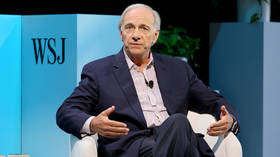It's curious that Trump is so dependent upon tariffs to rescue the economy. The Miracle of Argentina last year was simply amazing, and yet, Milei did not use tariffs significantly, I don't think. I don't believe that he turned any of his friends or allies into economic enemies, nor threatened to destroy their economies.
Moody’s issues warning on US finances

Ratings agency Moody’s has sounded the alarm on the United States fiscal health, warning of a continued decline due to widening budget deficits and increasing concerns over debt affordability.
The warning comes as the national debt surpasses $36 trillion and annual deficits exceed $1.7 trillion, raising concerns about the government’s ability to manage its financial obligations.
”[US] fiscal strength is on course for a continued multiyear decline”, having already “deteriorated further” since Moody’s assigned a negative outlook to America’s top-notch AAA credit rating in November 2023, the agency said in a report on Tuesday, as cited by Financial Times.
US President Donald Trump has advocated measures aimed at stabilizing the nation’s finances, including implementing significant tariffs and proposing tax cuts intended to stimulate economic growth. However, Moody’s has cautioned that extending substantial tax cuts without implementing significant spending reductions could exacerbate the country’s fiscal challenges.
”We see diminished prospects that these strengths will continue to offset widening fiscal deficits and declining debt affordability,” it said, according to Reuters.
Republicans are pushing for a $4.5 trillion extension of tax cuts, which would in turn require significant spending reductions, something that may conflict with Trump’s commitment to protect social programs, the agency noted.
The Department of Government Efficiency (DOGE), led by Elon Musk, tasked with reducing wasteful spending, claims to have achieved $115 billion in savings nationwide. However, according to Moody’s, such cuts are relatively minor compared to mandatory spending obligations.
The agency projects that, without effective policy interventions, America’s debt-to-GDP ratio could rise from the current 124% to approximately 130% by 2035, with interest payments consuming about 30% of federal revenue.
===============================================================================================
Trump is playing a dangerous game with America's War Industry. If they suddenly start thinking that he's going to cost them money, his life is worthless.
Trump’s tariffs threaten US arms production – Politico

US President Donald Trump’s tariff agenda could threaten American arms production, and if fully enacted, upend global supply chains, Politico reported on Friday citing defense experts.
On Wednesday, Trump rolled out a broad new slate of tariffs ranging from 10% to 49% on imports from all countries, based on what the US president called the principle of reciprocity. Hailing the move as a declaration of economic independence, Trump cast the tariffs as a step toward rebalancing America’s trade relationships. Economists across the globe have criticized the move.
According to a dozen diplomats, lawmakers, officials, and defense industry analysts interviewed by Politico, Washington’s latest move could prompt already wary US allies to look for alternative partners. Such a shift would deal a blow to the US defense industry – a major global arms supplier.
“There’s going to be shortages of supplies, tit-for-tats, and our allies and other partners are going to retaliate,” Bill Greenwalt, a former Pentagon acquisition official told the outlet. “Some potentially vital supplies are either going to cost a whole heck of a lot more than what they did or they’re just not going to be available.”
The sweeping tariffs, including a 20% levy on imports from the EU and 10% on goods from the UK and Australia, could drive up the cost of American-made weapons and disrupt international partnerships, the outlet said.
Among the programs potentially affected are the F-35 fighter jet, which is a partnership involving 20 nations. Rocket and air defense projects with Norway and Israel could also feel the squeeze.
“We count on the US for the best equipment,” said a European official. “European industrial capacity has greatly improved and we want to be security providers, not just consumers.” This could prompt greater investment in EU manufacturing, the source said, as nations look to reduce their dependence on American components and supplies for key weapons systems.
According to the outlet, a trilateral pact between Australia, the UK, and the US to build nuclear-powered submarines and share advanced technologies could also be at risk if rising parts costs make the project financially unsustainable.
Sen. Mark Kelly, a senior democrat on the Senate Armed Services Committee, highlighted the complexity of the global defense supply chain, noting that many military products cross international borders multiple times during assembly, potentially racking up tariffs each time.
Business groups are reportedly urging the Trump administration to grant the defense industry a strategic exemption from the new taxes, warning that without it, the Pentagon could face soaring costs and critical supply chain disruptions.
=====================================================================
US faces fiscal collapse
– Michael Bloomberg

The US is heading for a “fiscal breakdown,” and Congress should take urgent measures to restore fiscal control instead of eyeing more borrowing, billionaire Michael Bloomberg believes.
The former New York Mayor warned about the impending collapse on Tuesday in the media outlet he established. He reflected on the latest Congressional Budget Office (CBO) projections, that indicated the US budget deficit and federal debt are bound to grow, albeit at slower speeds than projected a year ago.
These dire forecasts send an “unambiguous message” that “there’ll be a reckoning, and it will be grim” unless Congress urgently changes course, Bloomberg warned. The US is heading towards a “fiscal breakdown” given that public borrowing is expected “to remain at this elevated level or higher for decades,” he pointed out.
“The federal government is currently spending roughly $7 trillion and collecting only $5 trillion in taxes annually. The resulting deficit is a little over 6% of gross domestic product, a disturbingly high number for an economy around full employment,” he wrote. US deficits have reached record levels this decade.
Assuming no recessions, public debt will rise to 100% of GDP this year and 118% by 2035 – and it just keeps rising from there.
The founder of Bloomberg L. P. criticized the proposed tax cuts repeatedly promised by US President Donald Trump as well as the import duties he is pursuing in order to restore the balance of trade. “The [tariffs’] impact on overall revenue is likely to be negative, because tariffs depress commercial activity and job creation,” Bloomberg suggested.
The ongoing cost-cutting efforts of the Trump administration are unlikely to have any long-term impact on the budget, while damaging public services and angering voters who see that “public parks are closed, health care is declining, and deaths from infectious disease are becoming more common,” Bloomberg suggested.
“Savings from slashing the federal payroll won’t have any appreciable effect, either. For all the media attention generated by cuts to personnel and programs — and some of them are warranted — they are having almost no impact on restraining the budget deficit,” he wrote.
Instead, the US government should cautiously raise taxes while further reducing spending and keep some pro-growth measures intact, such as a “bigger standard income-tax deduction and stronger investment incentives,” in order to “deliver a substantial net reduction in projected deficits,” Bloomberg suggested.
“Restoring fiscal control should be job No. 1 for this Congress. The only sensible approach is to combine moderate tax increases and judicious cuts in spending. Spreading the burden would allow the changes to be more palatable and gradual, if they’re undertaken soon,” he wrote.
=======================================================================



